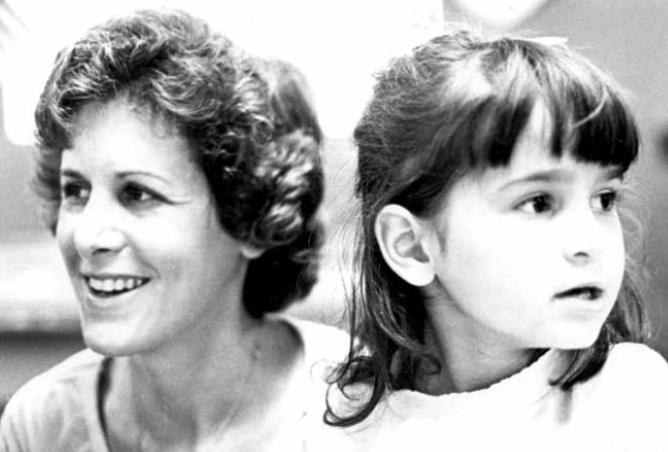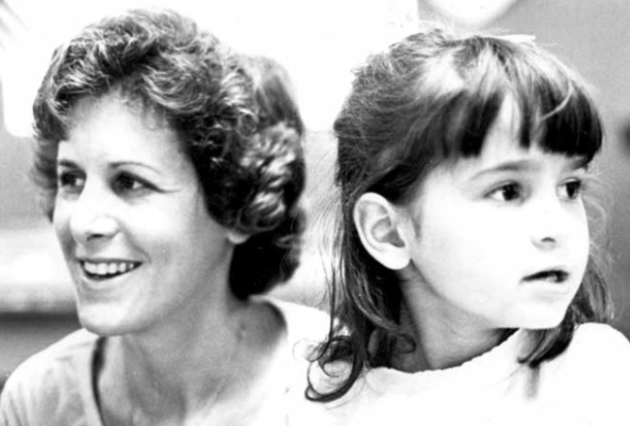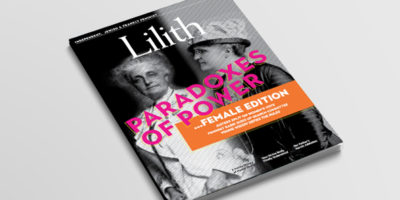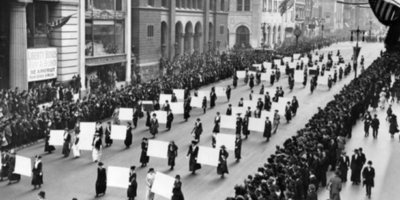
A Family History of Mental Illness

PART 1
2013
•
My mother tried to kill herself on Passover. She was 69 years old when she went into the garage, closed the door, got into the car, turned it on, and sat there waiting for the carbon monoxide to overtake her. People think depression is the way it looks on the TV commercials for anti-depressants—languid, lying down on the couch, like regular life slowed down. But it’s not that way at all. It’s like being trapped in a burning house and no one around you can see that you’re on fire. They are asking you to do stupid things like get out of bed and take a shower and put on some clothes and eat breakfast and you are like, “I can’t do any of those things because I am ON FIRE.” But no one hears you. No one hears a single word you say.
Did my mother want to die? Of course not. She just wanted to put out the flames.
1994
•
The day my parents picked me up from college to take me to the hospital, I wore a black ribbed shirt with tiny black buttons down the front and a thin ripple of lace around the neckline, black gym pants that were held up with a brown shoelace tied around my waist, and black shoes with wooden heels. My hair was shiny and it smelled like oranges.
My parents arrived at my campus apartment while I was still getting ready. I shared the townhouse with my best friend and my boyfriend. As I like to remember it, my father came into my room on the second floor, folded me into his arms, and carried me down the stairs. But it couldn’t have happened that way. I was twenty years old; I felt light enough to float away but I was still frustratingly moored to the Earth. I must have walked down myself holding my own bags. I had packed way too much. I didn’t know what the person I had been might want to wear when she returned.
PART II
1976
•
When I was two years old, my mother got pregnant. She asked for an amniocentesis. Her doctor said she didn’t need one. She was 32 years old and she had a healthy toddler at home. But my mother insisted, and she wasn’t one to insist.
My mother told this to me when I was 11. “I felt like something was wrong,” she said. The results of the test didn’t come until she was six months pregnant. That’s just how long it used to take. And it proved she was right. There was something very wrong with this baby. “It would have been unable to speak or move, like those children you see strapped into wheelchairs,” my mother said. So she chose to end the pregnancy.
Her doctor did the procedure on the maternity ward in the hospital. My mother was at the end of her second trimester. Labor was induced. The fetus, a girl, was buried in a Jewish cemetery. After that, my mother had her first depression. It lasted for 12 months.
My mother told me she just lay in bed that whole year.
“Where was I?” I asked her.
“Right there with me.”
1994
•
The car ride to the hospital with my parents was quiet. I didn’t know exactly where we were headed. I pictured a sanitarium with beautiful, sad, slim young women in billowing white dresses with their wavy brown hair pinned loosely onto the tops of their heads. They’d be lying on lounge chairs or strolling over green manicured lawns, maybe with their arms linked through one another’s.
I had read a lot of books about eating disorders, even though I wasn’t totally convinced I had an eating disorder myself. My weight was not in the double-digits. My hair was not dull or falling out. I didn’t look as thin as the ghostly blonde girl I saw at the campus gym any time I went, day or night, whose body was covered with fine white fur. It didn’t seem fair that she was so much better than I was at losing weight. She was pretty, too. Thin was all I had.
At one point we pulled into a rest stop and I got a bottle of Diet Pepsi. My mother asked tentatively if I wanted a snack, as well. “That option is not available to me,” I wanted to tell her. It was the line I used with myself when I passed by the bread table in the All-Campus Dining Center or by the cookies the size of dinner plates in the Retreat. Why couldn’t she see that? I was not a person who needed snacks. I was not a person who needed anything. I was a person who could survive on aspartame and air.
PART III
1984
•
The year I was in fourth grade, my mother was depressed again. She and my father argued late into the night, every night. My father had a firm whisper yell, and my mother had a low growl. My father was angry at my mother for being sick and my mother was angry at my father for not making her better.
One night their voices grew noisier and scarier than usual, and I called out to them to stop. They didn’t hear so I yelled louder. They both came running down the hall into my room. My father looked wrong in there. He seemed too big for the space, with its blue shag carpet and wallpaper with images of children dancing merrily. He sat on one side of me and pulled me close to him. My mother sat on the other side and tried to pull me over to her but my father wouldn’t let her. “No,” he said, wrapping his arm tight around me. “She’s my daughter, too,” my mother said. “Not when you’re like this, she’s not,” my father said. If I wasn’t my mother’s daughter, I was no one.
1994
•
I was surprised when we pulled up in front of a building that looked like a normal hospital. No rolling hills. No willowy women strolling the grounds arm-in-arm.
The campus doctor had called ahead and reserved me a spot on the eating disorders unit, so the hospital was expecting us. But we had to wait for a nurse to do my intake. We sat in the waiting room among regular people with regular medical problems. I wondered what they saw when they looked at me. Did they know I wasn’t regular? Did they know I had done this to myself on purpose? Did they see how hard I had worked?
A few weeks before I left college to go into the hospital, my boyfriend had come into the basement of our townhouse while I was riding the stationary bike. Until this point, he had dealt with my weight loss and restricted eating by pretending they weren’t happening. At night, when he slipped into bed and tried to kiss me, I pretended to be asleep. He was naturally thin, and now I was unnaturally thin; his hipbones clanked against mine. It hurt.
That day, he asked if I wanted to come to a party with him and I told him I couldn’t. The reason, which I didn’t say, was that I had to pedal until the veins on my arms stood out and the hollows beneath my thumbs sunk in.
“You used be fun,” he said. “But now you’re insane.”
While my parents and I waited for my name to be called, I went to the bathroom. I wanted to measure my thighs one last time. I wrapped my hands around the topmost part of each thigh thumb-to-thumb and pinky-to-pinky. I didn’t have to stretch my fingers at all; there was room to spare. I felt like I had accomplished something. I just wasn’t sure what it was.
PART IV
1986
•
The year I was in sixth grade, my mother had another depression. My parents told me over dinner at a bleak cafeteria-style restaurant in the mall.
This time I was prepared. I had seen the signs. I kept track of them on the teddy bear calendar that hung in my room. On the days when my mother had her monotone voice, I colored a neat black triangle in the bottom left corner of that day’s square. One day was probably nothing to worry about. It was just a bad mood that would pass. But two days, or three or four, was reason to worry. Especially when she started listening to that Neil Diamond album with “September Morn” on it. And when she didn’t want to get out of bed in the morning or go into bed at night.
I wrote motivational sayings on 3×5 cards and left them around the house for my mother to find:
The journey of 1,000 miles begins with a single step.
Fall down seven times, stand up eight.
Today is the first day of the rest of your life.
I did relaxation exercises with my mother at bedtime to help her fall asleep:
Picture yourself in a meadow. The grass is soft and the breeze is gentle. I tried so hard to make her better. I tried everything I could think of, everything I had seen on TV shows and in movies. But nothing worked.
1994
•
At my intake, a nurse asked if I was thinking clearly. The question seemed absurd. I had just been at college the day before, where I had been doing all of my work—well; showing up for all of my classes—on time. In the previous week, I had drunk a case of Diet Orange Slice and eaten one apple per day. Was I thinking clearly? Obviously. I was thinking about pursuing my goal: to lose as much weight as possible. And the way to lose as much weight as possible was to consume as few calories and as little fat as possible. What could have been clearer than that?
The previous year, when I was 19 years old, I used a red spiral-bound notebook as a journal. Every day I wrote in it, “If I could just lose five pounds, I would be happy.”
I was in my sophomore year at college, and I had a small single room with an Indian tapestry hanging from the wall and a bedspread from Urban Outfitters. Every morning I took the scale out from the closet where I kept it. I had stolen it from the bathroom at home. It was a square black scale with an oversized round dial, and the number on it was like a personalized horoscope. Higher meant a bad day. Lower meant a better day. But it was never low enough. I wanted those five pounds gone. And the want thrummed through my body every minute of every day. Want. Want. Want. Want. Want. Want. Want.
That summer, I found the answer in fat free. First I lost the five pounds. And I was happy. For a day. Then I realized losing seven pounds would make me even happier. Then 10. Then 12. Then 30.
When I returned to school for the start of junior year, my best friend told me that people were asking if I had cancer. I went to bed each night halfway expecting I would not wake up the next morning, but I hoped that if I died, someone would weigh my body before they buried me, so they would see how light I was.
Did I want to die? Of course not. I just wanted to put out the flames.
PART V
2013
•
The psychiatric ER is different from the regular ER. In the psychiatric ER, there are police officers, and once you admit that you are a danger to yourself, as my mother did only after my father and I forced her to, they will not let you leave. You are now on a 72-hour hold, which is also called a 5150.
My father and I were allowed to walk with her from the psychiatric ER to the locked unit where she would be held. A nurse accompanied us. It was late at night by then, a full six hours after we had first arrived at the hospital, and the halls were quiet and empty. My mother didn’t say a word. I held her hand, or at least I hope I did.
We could go with her only as far as the door to the psychiatric ward; we weren’t allowed on the unit outside of visiting hours. My father and I watched through the shatterproof glass window as the nurse led my mother down the hall to her room. A painful burn hovered in my chest for a moment, and I cried. But then I felt something else: relief.
We left the hospital and went to my cousin’s house. She had hosted the seder hours earlier, without us, but she was still awake when we got there. She pulled all the leftovers out of the refrigerator: deviled eggs, two types of kugel, matzoh with butter and salt, brisket, and yams.
During my treatment for anorexia, the staff at the hospital was always asking: What are you not thinking about when you’re thinking about food? The answer was so obvious that I chided myself for being a cliché. My mother. My mother. My mother. Her sickness. Her pain. Her suffering. My powerlessness to help her. If I couldn’t make her better, I may as well just make myself disappear. If I wasn’t my mother’s daughter, I was no one.
For years since my release from the hospital, Passover had plagued me. The meal was too long. I didn’t even like most of the food, but there was a lot of it and it was hard to keep track of exactly what I had eaten. Was it too much or too little or just enough? But this time, in the middle of the night, after all we had been through, I allowed myself to think of the food, to luxuriate in it. The saltiness of the deviled eggs. The crunchiness of the matzoh. The sweetness of the yams. I ate as much as I wanted, and not one bite less.
Joy Peskin is a children’s books editor and editorial director. Her writing has appeared in Parents magazine and Publishers Weekly.



